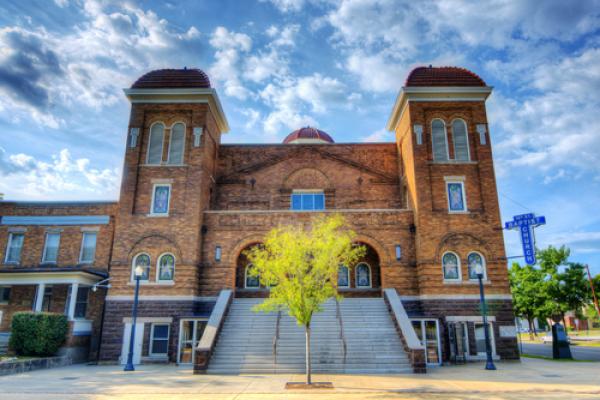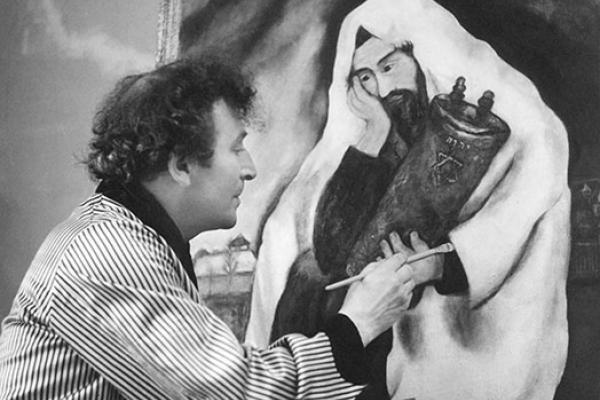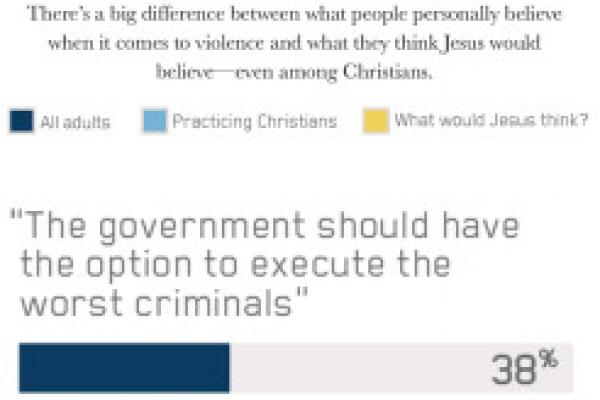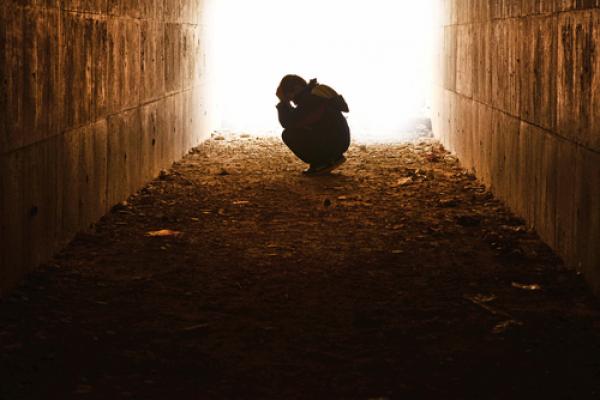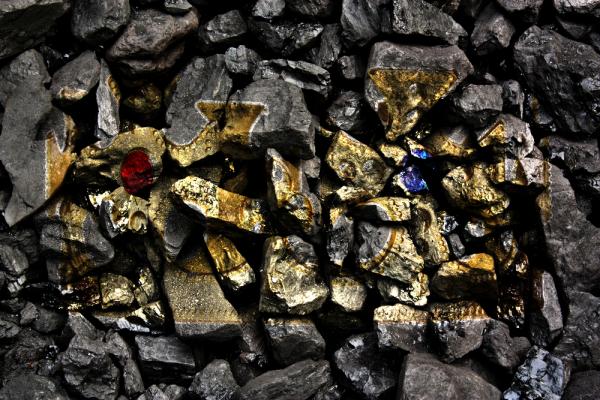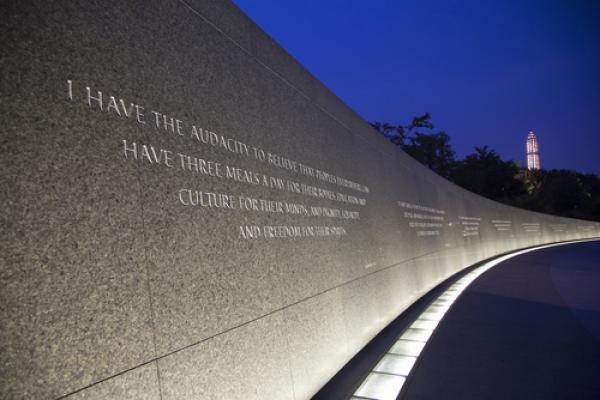There is no question that our nation is currently deeply divided about a great many issues. In our effort to enshrine him, some may have lost sight that Dr. Martin Luther King Jr. too addressed a nation that was divided. With all the media focus on the 50th anniversary of the Kennedy assassination this past fall, the 50th anniversary of another great national tragedy received little notice. On September 15, 1963, white racists bombed the 16th Street Baptist Church in Birmingham, Ala., killing four young African-American girls who were attending Sunday school.
This Martin Luther King Day, the SALT project has created a short, inspiring film retelling the famous last four minutes of King’s, “I Have A Dream” speech. Enjoy!
At a moment when the world is flush with new books and ever-evolving interpretations of Jesus, one of the last century’s artistic masters is providing art lovers with a striking take on the first-century religious figure.
The first U.S. exhibition exploring the “darker works” of Marc Chagall (1887-1985) shows a Jewish artist obsessed with Jesus.
“Chagall: Love, War, and Exile,” at The Jewish Museum in New York showcases the work of the Russian-French artist during World War II as he tried to make sense of a world gone mad.
Of particular interest are paintings depicting the crucified Jesus — depictions that are often read as metaphors not only for war but the particular expressions of Jewish suffering and persecution in Europe during the 1930s and 1940s.
One day after the state of Ohio executed a man for murder, a new poll shows younger Christians are not as supportive of the death penalty as older members of their faith.
When asked if they agreed that “the government should have the option to execute the worst criminals,” 42 percent of self-identified Christian boomers, born between 1946 and 1964, said “yes.” Only 32 percent of self-identified Christian millennials, born between 1980 and 2000, said the same thing.
The poll conducted by Barna Group this past summer and released to Religion News Service Friday, surveyed 1,000 American adults and has a margin of error of plus or minus 2.6 percentage points.
It showed an even sharper difference in support for the death penalty among “practicing Christians,” which Barna defined as those who say faith is very important to their lives and have attended church at least once in the last month. Nearly half of practicing Christian boomers support the government’s right to execute the worst criminals, while only 23 percent of practicing Christian millennials do.
I had the idea for this blog post a couple weeks ago, but I thought it best to wait until around this time to release it. Just two weeks into the new year, this is usually the stage in which people are slowly becoming less committed to their resolutions.
I know there is much disdain for the phrase "new year, new me." We all have family and friends who commit themselves to something on January 1st, whether it be to exercise more, eat healthier, become a better Christian, etc., and just days into the new year they have already failed to live out those commitments. The phrase probably should be "new year, same old me." This post is not intended to stroke the ego of our skeptics, rather, Lord willing, it will serve as encouragement to those who strive to better themselves.
Although we struggle to stay faithful to our new found endeavors, thankfully we serve a God who is both patient and forgiving. Psalm 86:15 states, "But you, O Lord, are a God merciful and gracious, slow to anger and abounding in steadfast love and faithfulness."
SNAP began in 1964 when President Lyndon B. Johnson signed the Food Stamp Act as part of his unconditional “War on Poverty.” In his remarks upon signing, Johnson said: “I believe the Food Stamp Act weds the best of the humanitarian instincts of the American people with the best of the free enterprise system. Instead of establishing a duplicate public system to distribute food surplus to the needy, this act permits us to use our highly efficient commercial food distribution system.”
Johnson continued: “It is one of many sensible and needed steps we have taken to apply the power of America's new abundance to the task of building a better life for every American.”
Imagine. Fifty years ago the Food Stamp Act was viewed not as charity, but rather as an ingenious utilization of American enterprise in order to help “build a better life for every American.”
And it is genius.
Many of us may not know what it is like to be hungry, to regularly miss meals, or to consume a diet void of essential nutrients to live a healthy life. Poet, diplomat, and politician Pablo Neruda captures this feeling well in his poem “The Great Tablecloth.” Just before the holidays, millions of Americans learned what some aspect of hunger felt like as they saw a reduction in their SNAP (formerly food stamp) benefits.
On Nov. 1, every SNAP household saw its grocery budget reduced when an $11 billion cut went into effect — the equivalent of 10 million food stamp meals a day. And the program isn’t out of the woods yet. The House and Senate have begun to finalize a farm bill that will impact vital anti-hunger programs. A compromise proposal expected in the coming weeks could further cut SNAP by as much as $8 billion, at a time when lawmakers need to protect and strengthen it.
I’ll be upfront and admit it. When I heard about the chemical spill that shut down the water supply for 300,000 of my fellow West Virginians, I felt an odd tug of relief. “Maybe now something will get straightened out,” I thought to myself.
Sure, what I felt might sound callously unfeeling. After all, the chemical spill closed down businesses and schools, shut down bathing, and reduced populations to scrapping for potable water. Happily, thousands of neighbors and outliers pitched in to deliver water from bottles to tankers to the beleaguered people.
Welcome, world, to West Virginia, your national energy sacrifice state. Our state has a king — name’s Coal. Just as in Nebuchadnezzar’s era (Daniel 3), on cue politicians, business people, and media outlets bow their knee to King Coal lest their fates be a metaphorical fiery furnace.
Before readers think I’m off-track, let me first back up.
Prophets are always asking questions. Tough questions. Unsettling questions. Questions that they pose to themselves, then try to answer by how they live.
Questions such as:
What’s in our hearts? Are we concerned too much about ourselves and too little about others? Do we believe in love? Why do we give in so readily to bitterness and hatred?
Why do so few have so much, while so many have so little? Aren’t we all diminished by the poverty, discrimination, violence, and the various injustices in our world? Why do we glamorize violence and weapons as solutions to our problems?
